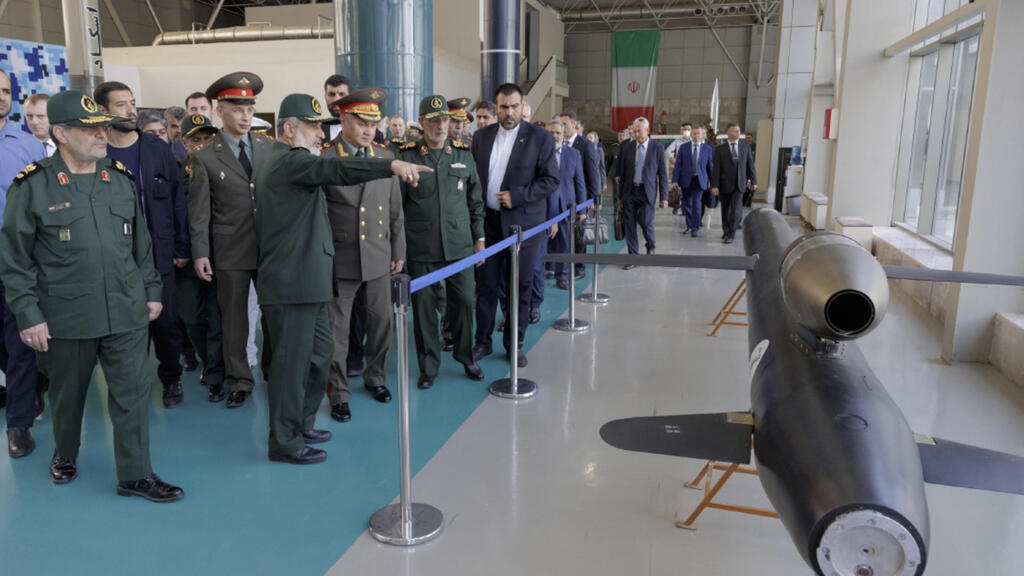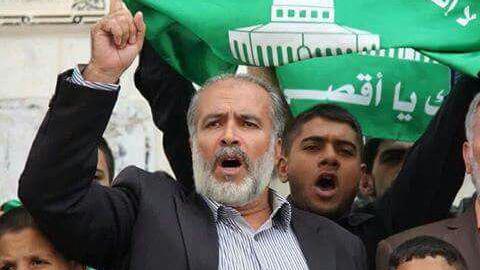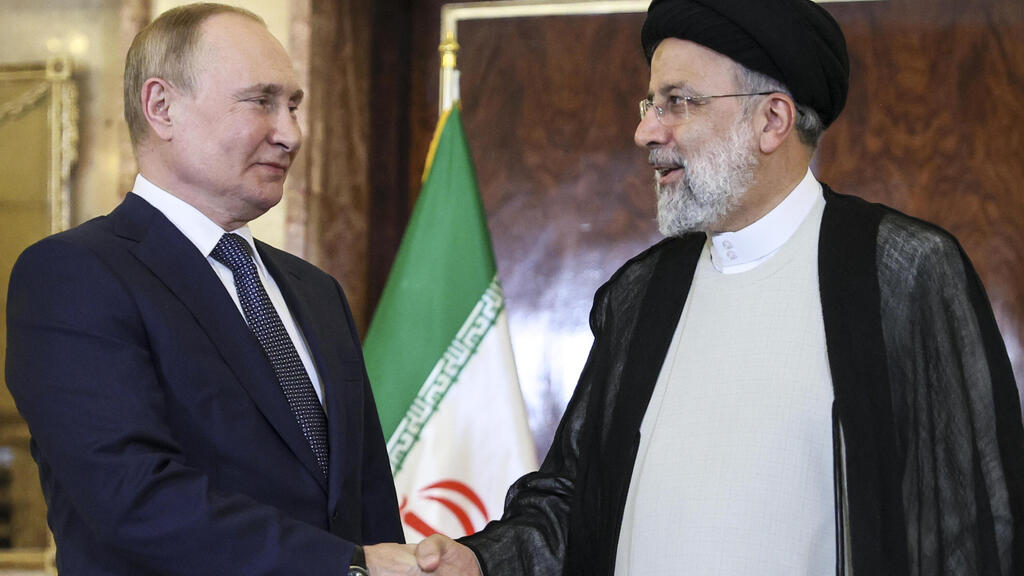Getting your Trinity Audio player ready...
Western governments seem to overlook the Gordian knot that binds together the wars in Ukraine and the Middle East. By refusing to push for a fair compromise in Eastern Europe, fueling President Volodymyr Zelensky with ever more futile weapons and imposing new sanctions on Russia, they have pushed Russia to forge alliances with Iran's rogue Revolutionary Guards and its terror proxies – Hamas, Hezbollah, the Yemeni Houthis, and militias in Iraq and Syria.
More precisely, the Western policy in Ukraine renders a winning argument to those in Moscow who have hitherto failed to drag their country into forming bonds with destabilizing forces.
3 View gallery


Former Russian Defense Minister Shoigu and delegation views Iranian drones during a visit to Iran
(Photo: EPA)
It is important to dwell on how "the war in Ukraine has led to unprecedented levels of Russian-Iranian cooperation in the military, economic and political spheres," as summarized in a recent article from the European Council on Foreign Relations.
Dina Esfandiary, an expert in Russian-Iranian relations, wrote in Foreign Affairs that "it is highly unlikely that Moscow would have gone banging on Tehran’s door were it not for the war in Ukraine, which has heightened Russia’s need for weapons while cutting it off from most of the world’s leading suppliers of technology."
The same applies to the Iranians, who were fiercely divided on the matter prior to the delinquent Russian invasion. The hardliners behind Supreme Leader Ali Khamenei managed to overpower the opposition to a full alliance with Russia primarily by virtue of the prolonging of the war in Ukraine.
Since the start of the war, the two countries have intensified their joint training and exchange of knowledge; demonstrated mutual diplomatic coordination and support; and made reciprocal procurements of sophisticated weaponry systems ranging from electronic jamming and other air defense technologies through drones and missiles to fighter jets.
After more than two years of concerted efforts to demonize everything Russian, it is hard to comprehend what a profound shift it is for Russia to join forces with Iranian hardliners and their terror proxies, harming years-long good relations with Israel, the Palestinian Authority, Egypt, Saudi Arabia and the gulf principalities. According to Esfandiary, Russia and Iran "have a tumultuous history of distrust and betrayal.
Before February 2022, Russia was turning a blind eye to Israel's aerial targeting of Iranian convoys of military supplies to Hezbollah on Syrian soil. In addition, it supported the actions of the PA to curtail Hamas' efforts to undermine its rule in the West Bank and promoted a PA-led reunification.
Furthermore, Russia used to position itself at the forefront of combating Islamic terrorism. One can refer to President Putin's speech in the German Bundestag two weeks after September 11, 2001, where he declared the end of the Cold War and stated that the international fault lines no longer run between East and West, but between secular states and Islamic terrorist organizations, which equally threaten the former adversaries.
Neocons and emergence of 'Axis of Resistance'
Instead of embracing this positive initiative, U.S. neoconservatives, who have shaped American foreign policy in the last quarter of a century by dint of their bipartisan hegemony, have carried out two interlinked projects: the isolation of Russia in Europe and the disintegration of Arab autocracies in the Middle East.
Critics justifiably point out the over 20-year process of admitting former Warsaw Pact states into NATO, through which the once-planned 1990 system of collective security and the inclusion of Russia was gradually abandoned, which constituted a diplomatic gift to the revanchists in the Russian elite.
The dismantling of Iraq, Libya and temporarily also Egypt, as well as the civil war in Syria, are often mentioned as the rotten fruits of the neocon's project to impose democracy in the Middle East. Less known is that the rule of Mahmoud Abbas in the Palestinian Authority was also targeted.
In 2005, the State Department imposed legislative elections in the Palestinian territories. Hamas was allowed to participate despite of its violent Islamic ideology, and despite rejecting all former agreements between the PA and Israel, executing armed struggle, deriding International humanitarian laws and civil rights, and blatantly disregarding the PA constitution and its election rules.
With Putin on their side, Abbas and then-Prime Minister Ariel Sharon tried to rescind the elections, but to no avail. Hamas won the elections by a 2% margin after breaching the ban on foreign funding by drawing on its foreign-backed welfare networks and using Iranian and Syrian funds to pay for a costly election campaign.
3 View gallery


Senior West Bank Hamas official Hussein Abu Kwaik in calls for Palestinian Authority elections in 2016
In recent years, several Islamic terror militias emerged on top of the disbanded and destabilized secular autocracies. Not enough that the neocons created the conditions for their rise, but Qatar, which hosts the largest U.S. army base in the Middle East and, as of 2026, Germany's main gas supplier, has funded these militias generously. With time, many of them have turned into Iranian proxies, calling themselves "The Axis of Resistance."
According to two senior Israeli security officials, the deepening of military, diplomatic and economic bonds between Russia and this axis presents an escalating peril to Israel's security. The stranglehold on Israel's borders is tightening; Iran can turn nuclear on short notice; and terrorist attacks on both Israel and secular Arab regimes benefit from the diplomatic support of a superpower.
How to drain the swamp
In an effort to drive a wedge between Russia and Iran, Western experts and politicians put forward different measures. One is a cease-fire in Gaza, another is the encouragement of Arab leaders to exert pressure on Russia, and a third is capitalizing on Iran's attack on Israel to impose another package of economic sanctions against Iran (ignoring the fact that sanctions bring Russia and Iran closer together). However, none of these is truly efficient; rather, they can be likened to stretching a mosquito net over the swamp, instead of simply draining it by putting an end to the war in Ukraine.
Recent events have opened a rare opportunity to avoid the partition of the Middle East into two opposing blocs. The patrons of the Russian-Iranian alliance were Iran's President Ebrahim Raisi and Russia's Secretary of the Security Council Nikolai Patrushev, the "hawk’s hawk" according to Politico. The death of Raisi and Patrushev's removal from power by Putin strengthened the forces in both countries who rejected the partition of the Middle East into two adversarial sides.
Nevertheless, and despite Russia's recent advance on the battlefield and the growing understanding that Ukraine cannot regain Donbas and Crimea without the help of Western soldiers – which risks the eruption of a world war – Western governments keep fomenting the futile bloodbath in Ukraine.
Western governments are undermining themselves
Setting aside the pivotal issue of natural energy, the official objectives of Western governments in the Middle East are the guarantee of Israel's security, regional de-escalation, protection of civilians in Gaza alongside the release of the Israeli hostages, and progress towards a two-state solution.
Nevertheless, by clinging onto a never-ending war in Ukraine, they are not only cultivating among the Ukrainians false hopes for a military triumph, increasing the casualties on both sides, pushing Ukraine to a worse position in the ultimate negotiations and putting Europe at risk of a dangerous escalation, but also undermining their own Middle Eastern policy by driving Moscow to Tehran.
 Yotam Givoli
Yotam Givoli However, there is a righteous person in Sodom – Robert Kennedy Jr. In an interview with the Saudi TV channel Al-Arabiya on 17 February, the controversial independent candidate for the U.S. presidency implied that following a settlement deal in Ukraine, the West could join forces with Russia and China to address the Middle East:
"I'd have a different relationship with world leaders, like Xi, like Putin and Sisi. I think there is a chance for peace short of the complete annihilation of Hamas, if all the other world leaders and the world community came together to support Israel, and said "we are going to help you solve this problem'."
Referring to the Middle East, West Germany's former Chancellor Willy Brandt stated in his memoirs that his "determined peace policy in Europe can be a factor in a worldwide de-escalation". In the face of a harmful Western policy that is escalating an ill-fated war and encouraging Russia to destabilize the Middle East, Brandt's words are more relevant than ever.
Yotam Givoli is an Israeli-German historian. He completed his MA at the University of Cambridge with a thesis about the West German policy towards the Israeli-Egyptian conflict from 1969 to 1975 and is now an ELES PhD Candidate for Modern History at the University of Mannheim.



